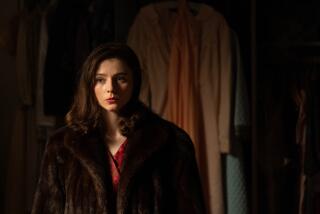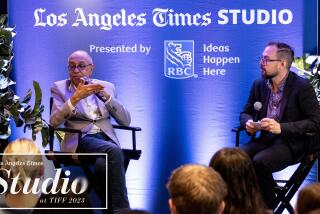‘Effie Gray’ paints a poignant portrait of Victorian era
- Share via
Genteel almost but not quite to a fault, “Effie Gray” is the decorous treatment of a story that shocked Victorian England: the romantic triangle of critic John Ruskin, his seriously unhappy wife, Euphemia “Effie” Gray, and his protege, the painter John Everett Millais.
Starring Dakota Fanning as the young Scottish bride and written by costar Emma Thompson, “Effie Gray” is never less than gorgeous to look at both indoors and out, as cinematographer Andrew Dunn, production designer James Merifield and costume designer Ruth Myers and their teams collaborate to create an enveloping, almost rhapsodic look for the film.
But all this visual splendor puts “Effie Gray” in danger of treating its scandalous story the way Ruskin apparently treated his wife, as a beautiful object to be admired from a distance but never emotionally engaged with.
Directed by Richard Laxton, “Effie Gray” is fortunate to have enough strong performances by Fanning, Thompson and top-flight costars (including cameos by James Fox, Robbie Coltrane, Derek Jacobi and even Claudia Cardinale) to eventually overcome the doldrums of decorum and create the feeling we’ve been needing.
Ruskin, the most influential art critic of the age, first met Effie when she was a girl of 12. The two were married when Effie was 20 and longing to leave rural Scotland for the cultural sophistication of London. There Ruskin held forth to the Pre-Raphaelite painters who were his disciples on his belief that “nature must rule every stroke of your brush. Paint what you see, draw what you see.”
(This has been an unlooked-for banner year for cinematic Ruskin watchers: He also makes an appearance, albeit an officious one, in Mike Leigh’s “Mr. Turner.”)
In this film, Ruskin (well-played by Greg Wise, Thompson’s husband) looks on Effie as a perfect beauty and considers himself “the luckiest of mortals” when she agrees to marry him, and she feels fortunate as well.
The newlyweds are to live with Ruskin’s parents (professionally played by veterans David Suchet and Julie Walters), but things start to go badly from the moment they walk in the door of their new home. That’s when the critic’s doting, overpossessive mother lays hands on “my treasure” and announces that she can’t wait to personally give him his bath.
It gets worse when, during a wedding night that has been much commented on from then to now, Effie disrobes in front of her husband, only to have him abruptly get up and leave the bedroom. The reasons for this non-consummation of the marriage have been endlessly speculated upon (the film refrains from expressing an opinion), but it was only the beginning of Effie’s travails.
Starting the very next morning, Effie finds herself a victim of Victorian decorum, someone with no real place in her husband’s life. He doesn’t want her around when he writes and thinks, not even to sharpen his pencils, and his officious mother, reminding Effie that “you have married no ordinary man,” tells her to find solace in growing roses and reading the Bible.
“What shall we do, what do married people do?” she asks her husband plaintively, and he replies, truthfully but unhelpfully, “I have as little idea as you.”
(Though viewers might reasonably speculate, given that Fanning is 21 and Wise 48, that age difference enters into the couple’s difficulties, this was historically not the case: Effie and Ruskin had only nine years between them.)
The couple goes off to Italy, where Ruskin works obsessively on one of his books, “The Stones of Venice,” and she finds herself romantically courted by a handsome Italian (Riccardo Scamarcio), a situation that only makes Ruskin crankier. “Venice was once a virgin,” he tells her pointedly. “Now she is a harlot.”
The only real ray of light in Effie’s life is Lady Eastlake, the wife of Charles Eastlake (Fox), the influential president of the Royal Academy. As played by Thompson, who has given herself the film’s best lines, Lady Eastlake is the fearless voice of reason this situation clearly needs.
Fanning, for her part, completely understands her role and its gently feminist context. Her performance is understated but always effective, a through line for audiences when things on screen go quiet.
The film heats up, as does this young wife’s life, when she gets to spend some time in her native Scotland with her husband and the young painter Millais, well-played by Tom Sturridge. His passionate nature attracts her, but in a culture where divorce was forbidden, this presents a problem.
“Effie Gray,” for some reason, omits a final intertitle telling what happened to Millais and Gray in real life. But the best thing about the ultimately involving way this romantic drama ends up on screen is that it’s sure to arouse enough interest to make those who don’t already know the outcome more than eager to look it up.
------------
‘Effie Gray’
MPAA rating: PG-13, for thematic and sexual content, and some nudity
Running time: 1 hour, 48 minutes
Playing: In limited release
More to Read
Only good movies
Get the Indie Focus newsletter, Mark Olsen's weekly guide to the world of cinema.
You may occasionally receive promotional content from the Los Angeles Times.











